This post is a bit different than what I originally planned to write about on this blog, but since we are not traveling these days due to COVID-19, I decided to look for local things to do.
Living in a very rural, backwoods kind of town, there’s not a lot of local things to do.
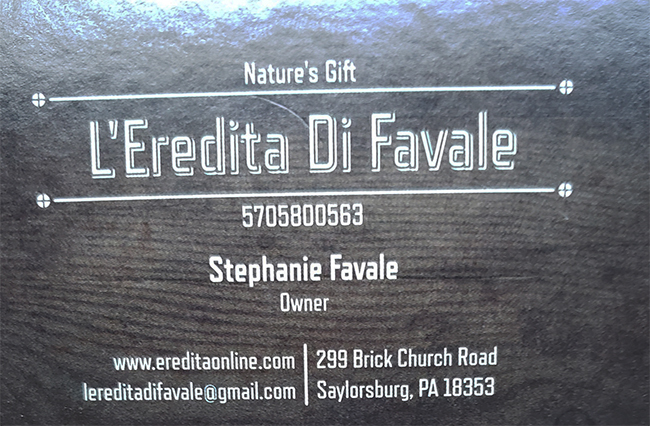
Fortunately a neighbor, who moved in about two years ago, started an Alpaca Farm. Not too many people know about Alpaca’s, according to Stephanie, who owns the farm along with her husband Anthony.
Stephanie and Anthony met in high school and are from Brooklyn, New York. They live in New York fifty percent of the time. The other fifty percent is spent at the farm in Saylorsburg, Pennsylvania.
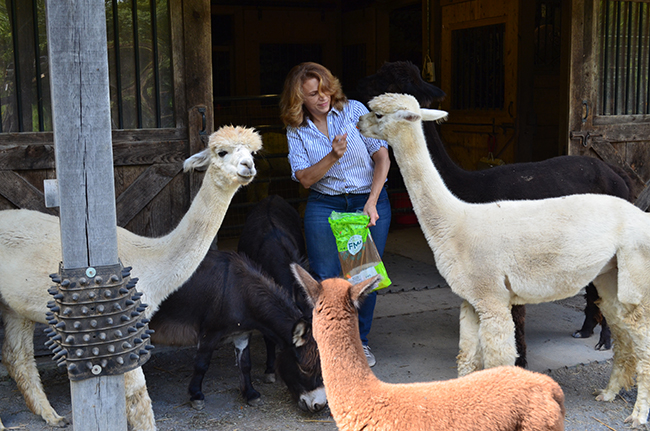
My interview with Stephanie was like talking to a friend. She told me so much about herself, her career, and her family. The more she told me, the more I wanted to know. She has lived a very interesting life so far, but for this post I’ll focus on L’Eredita di Favale Alpaca Farm.
The Name
I asked Stephanie where the name, L’Eredita di Favale came from. She gave me this little description: L’Eredita means legacy and Favale is their surname. She told me Anthony could explain it better.
A Little History
Anthony’s father immigrated to New York from Italy in the 1950’s with nothing. Two of Anthony’s brothers were born in Italy. They lived off of the land with no luxuries, no heat. The family farm was their livelihood.
Anthony remembers being thirteen years old and helping his father on the family farm. This left Anthony with great memories, and now wants to continue this “legacy” with his and Stephanie’s children and their grandchildren.
Interesting Fact
One thing I found interesting was that not many people from New York know what an Alpaca is. Well I guess city dwellers in general may not know about Alpacas. If you think about it, why would they? They’re city people, not country people. You don’t see Alpaca Farms in the city do you? But here, in Saylorsburg, in this area of Pennsylvania, Alpacas are popular.
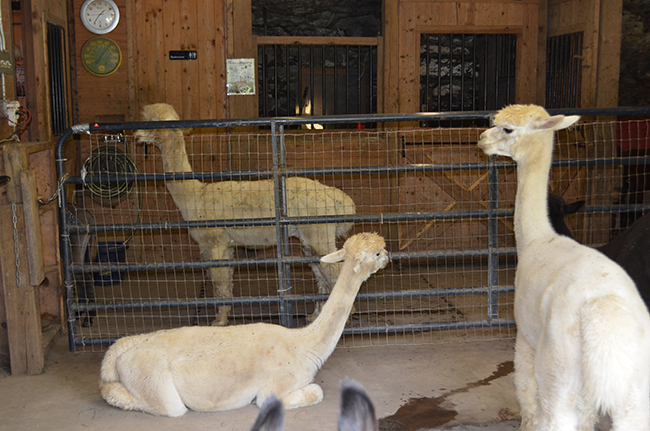
How the Farm Started
As Stephanie told me her story, she confessed that she knew nothing about Alpacas when she and Anthony decided to take on this journey.
They started by researching and visiting another Alpaca Farm in the area. Mary Baxter, who owns Pohopoco Creek Alpacas, became Stephanie’s mentor, teaching her all about Alpacas.

Mary taught Stephanie herd health which is how to halter the animals, how to weigh them, how to give the shots and vitamins, check their eyes, and how to score them, which means making sure they are the correct weight.
Fun Facts About Alpacas
- Alpacas are native to Peru
- Alpacas are 100% sustainable meaning everything that comes from an Alpaca can be used.
- The Peruvians eat the meat
- Their fleece is made into yarn
- The manure is used for fertilizer.
- It takes 15 alpacas to equal 1 horse in the course of feeding
- It is recommended to have at least 3 or more alpacas of one breed
- Alpacas are herd animals
- Male and female alpaca need to be kept separated, otherwise they will breed constantly
- A baby alpaca is called a cria
- An alpaca will live up to twenty-five years old.
- The alpaca fleece is hypoallergenic, is soft or softer than cashmere, and does not need to be dry cleaned
- Selling the yarn covers the cost to maintain alpaca
- The black to brown and white to grey yarns that come from alpacas are the natural colors of the alpacas.
- There are 22 natural alpaca colors
Future Plans
As Stephanie and Anthony grow their farm and alpaca herd, they plan to build an area for the Alpacas to graze while the current pad gets a break.
Also in the future, if zoning allows, Stephanie would like to add a café viewing area for those that would like to enjoy the alpacas from a distance.
Meeting the Alpacas
I was excited to meet these cute and cuddly animals. Stephanie and I walked to the pen, with her dog, Montana by our side, where they were anxiously waiting for us to visit. The donkey’s seemed excited as well because they were “braying” or hee-hawing as we approached.
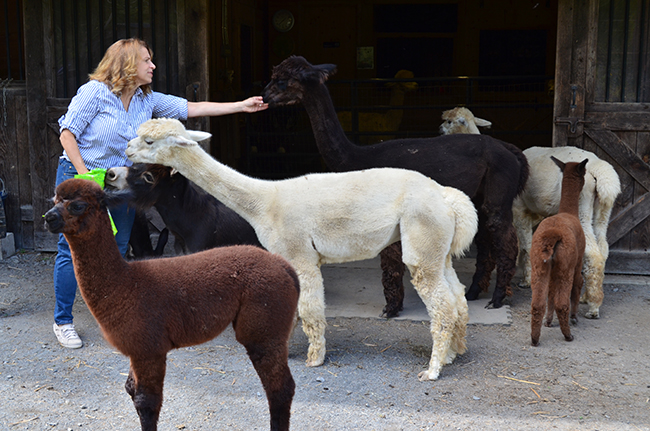
Alpacas are very friendly, especially if you have delicious carrots to feed them. They crowded around us in hopes of getting the orange treat.
We visited the females and babies first. Rita and her cris, (baby boy) Crete stayed close together, as did cria, (baby girl) Isle of “Skye” and her mother, Rosa Mae.
The third female alpaca is named Moorea.
The male alpacas were just as excited when we entered the pen. The males are much bulkier than the females.
Their names are, RPM who is the father of Skye, High Gear, father of Crete, and the third male is Nacho.
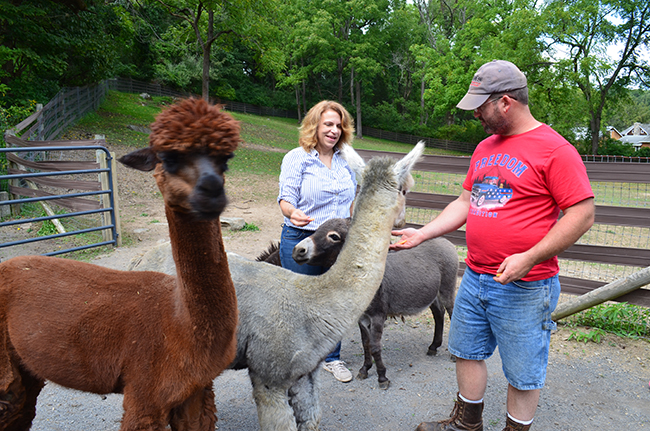
The babies stay with their mother for about a year. The only time the mother and male cria are separated sooner than a year is if he gets feisty and wants to mate.
On this farm, Stephanie thinks Crete will be joining his father before a year is over. He is “acting like a teenage boy” already.
Officially Alpaca People
Stephanie and Anthony are thrilled to be true “Alpaca people”. This happens when they successfully breed and have offspring from their herd.
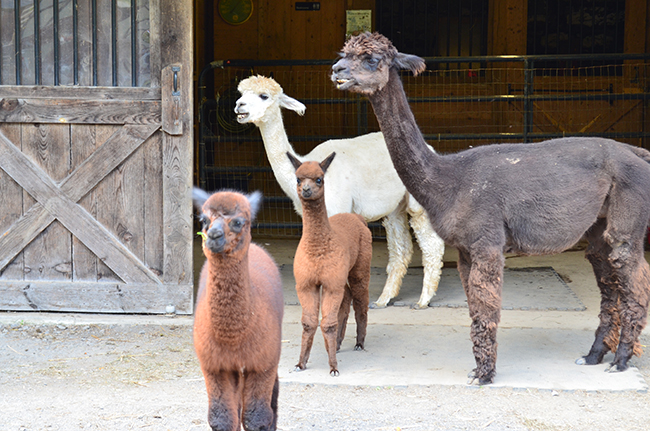
Alpacas can breed at any time and have only one baby at a time. The gestation period is eleven to twelve months, about 345 days or sometimes longer.
A baby alpaca weighs between 6 kg and 8 kg at birth and will reach between 25 kg and 40 kg at six months old.
Want to know more about these alpacas?
Check out their Facebook page or Instagram. Better yet, visit them for Alpaca Farm Days, which is help the last weekend of September.
I want to thank my new friends, Stephanie and Anthony for their time and the tour of their alpaca farm. I enjoyed our time together and learned so much about alpacas.

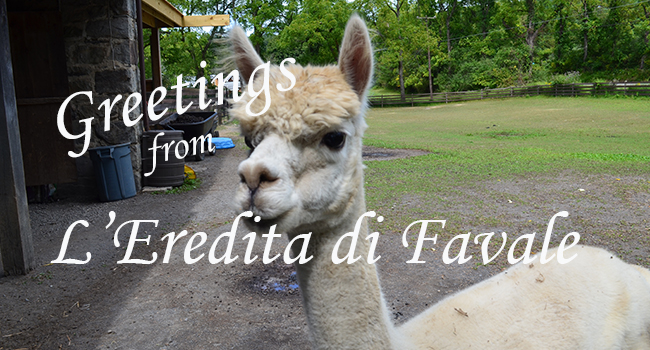
Hi Nana: Excellent and very interesting article you’ve written regarding ‘ L’Eridita di Favale ‘ – An established official Alpaca Farm in beautiful, scenic Saylorburg PA . You have given a very informative briefing on Alpaca, stating the joys and needed maintenance of these adorable cuties! To be sure Stephanie and Anthony Favale love their Alpaca. One can see by the amount of love, and care they provide, Alpaca are their passion.
I’ll have to check out your blog again. Very interesting!
Hi Zinnia,
Thank you for your comment! I glad you enjoyed the read and found it informative. Anthony and Stephanie definitely love what they are doing.
I hope you enjoy my other posts also. I’m working on adding my travel posts that were on my other blog http://www.renanamom.com. I have recently turned that blog into a crochet/craft blog.
Thanks again for visiting!!
Renee’, hi. I am so interested and very happy you have replied. I am desperate to relearn how to crochet again. Thank you for sharing! I will check out your crochet/craft blog and get in touch with you. I’m going to buy some Alpaca yarn from Stephanie and start moving my fingers and start crocheting again. I’ll be in touch!
Best,
Zinnia
Many years ago their farm was a horse farm and until Anthony and Stephanie came, the pasture and barn sat vacant. It’s so great to see the farm come to life again with the comical mini donkeys and beautiful Alpacas.
A great write up about some great people and neighbors.
I’m so happy you enjoyed this post, Gail. I remember the horses being there and missed them when they left.
Anthony and Stephanie are great people and I look forward to seeing their farm grow.
Thank you for your comment!